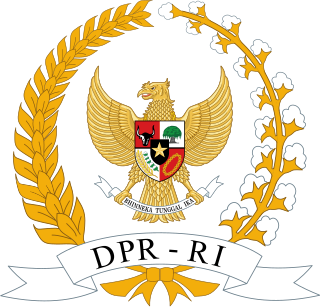
The House of Representatives of the Republic of Indonesia is one of two elected chambers of the People's Consultative Assembly (MPR), the national legislature of Indonesia. It is considered the lower house, while the Regional Representative Council (DPD) serves as the upper house; while the Indonesian constitution does not explicitly mention the divide, the DPR enjoys more power, privilege, and prestige compared to the DPD.
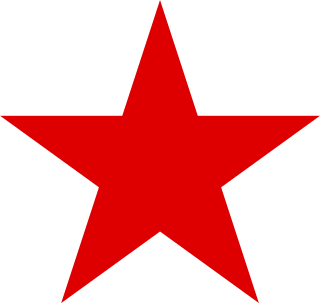
The Socialist Party of Indonesia was a political party in Indonesia from 1948 until 1960, when it was banned by President Sukarno.
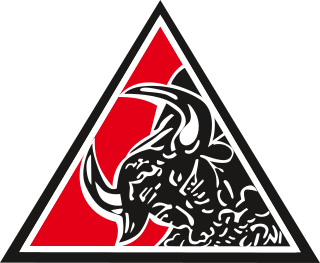
The Indonesian National Party was the name used by several nationalist political parties in Indonesia from 1927 until 1973. The first PNI was established by future President Sukarno. After independence, the new PNI supplied a number of prime ministers, and participated in the majority of cabinets in the 1950s and 1960s. The party was fused into the Indonesian Democratic Party in 1973. In the years following the reforms of the late 1990s, a number of parties claiming to be the continuation of previous PNIs stood in elections, but gained only a handful of seats.

The Council of Indonesian Muslim Associations Party, better known as the Masyumi Party, was a major Islamic political party in Indonesia during the Liberal Democracy Era in Indonesia. It was banned in 1960 by President Sukarno for supporting the PRRI rebellion.

The Liberal Democracy period in Indonesia, also known as the Era of Parliamentary Democracy, was a period in Indonesian political history, when the country was under a liberal democratic system. During this period, Indonesia held its first and only free and fair legislative election until 1999, but also saw continual political instability. The period began on 17 August 1950 following the dissolution of the federal United States of Indonesia, less than a year after its formation, and ended with the imposition of martial law and President Sukarno's decree, which resulted in the introduction of the Guided Democracy period on 5 July 1959.

Legislative elections were held in Indonesia on 29 September 1955 to elect the 257 members of the House of Representatives. The election was the first national election held since the end of the Indonesian National Revolution, and saw over 37 million valid votes cast in over 93 thousand polling locations. The result of the election was inconclusive, as no party was given a clear mandate. The legislature which was elected through the election would eventually be dissolved by President Sukarno in 1959, through Presidential Decree number 150.

Legislative elections were held in Indonesia on 3 July 1971, the first under the New Order regime. There were ten participants; nine political parties and the "functional group" Golkar, which came first with more than 60 percent of the vote, resulting in an absolute majority in the People's Representative Council.

Burhanuddin Harahap was an Indonesian politician and lawyer who served as prime minister of Indonesia from August 1955 until March 1956. He was a member of the Masyumi Party and served as Minister of Defense concurrently with his tenure as prime minister. Afterward, he took part in the unsuccessful Revolutionary Government of the Republic of Indonesia (PRRI) rebellion in West Sumatra.

Indonesian Islamic Union Party was an Islamic political party in Indonesia before and after independence. In 1973 it was merged into the United Development Party.

The Acoma Party was a communist party in Indonesia. It evolved out of the Young Communist Force. Acoma was converted into Partai Acoma on 8 August 1952. Acoma/Partai Acoma was led by Ibnu Parna.

The National People's Party, initially founded as the Indonesian National Party–Independent, was a political party in Indonesia. It was founded on 23 July 1950 after a split within the Indonesian National Party (PNI). The divisions with the PNI had appeared at the party congress in May the same year, when Sidik Djojosukarto's followers had emerged victorious. Djody Gondokusumo was the chairman of the party.
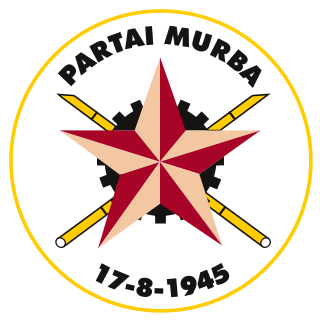
Murba Party was a 'national communist' political party in Indonesia. The party was founded by Tan Malaka, Chairul Saleh, Sukarni and Adam Malik in 1948. The history of the party was largely intertwined with that of the powerful Communist Party of Indonesia (PKI). Initially relations between PKI and the Murba Party were fluid, but gradually the two parties developed into each other's arch-enemies. The Murba Party continued to exist under the New Order, but was merged into the Indonesian Democratic Party in 1973.

The Indonesian Christian Party, better known as Parkindo, was a Christian political party active in Indonesia from 1950 until 1973, when it was merged to make the Indonesian Democratic Party.

The League of Supporters of Indonesian Independence was a right-wing nationalist political party in Indonesia established by former Army head General Abdul Haris Nasution as a vehicle for the Indonesian Army to enter the realm of politics. It was influential in persuading President Sukarno to introduce Guided Democracy in Indonesia and return to the 1945 Constitution.
The Great Indonesia Unity Party was an Indonesian political party established in 1948. It was founded by a group of dissenters who broke away from the Indonesian National Party (PNI) because of their dissatisfaction with the PNI's increasingly left-wing stance. Its chairman was Wongsonegoro, governor of Central Java. The party aimed to be based on neither religion like the Masjumi or a western political outlook. Initially known as the PNI-Merdeka (PNI-Independent) it subsequently changed its name to the Great Indonesia Unity Party.

Union of Islamic Education, also known as PERTI, is a Shafii-Ash'ari Islamic organization in Indonesia. The organization was founded by Sulaiman ar-Rasuli on May 5, 1928 in Candung, West Sumatra. In its development, PERTI had become a political party and gained four People's Representative Council (DPR-RI) seats and seven Constituent seats in 1955 general election.

Sartono was an Indonesian politician and lawyer who served as the first speaker of the House of Representatives (DPR) from 1950 until his resignation in 1960. He also served as acting president several times in his capacity as speaker following the resignation of Mohammad Hatta. Born into a Javanese family of noble blood, Sartono studied law at Leiden University. During his studies, he joined the Perhimpoenan Indonesia association and became an advocate for Indonesian independence. After graduating, he opened a law practice and helped found the Indonesian National Party (PNI) in 1927. He unsuccessfully defended the party's leaders when they were arrested by the colonial government in 1929.
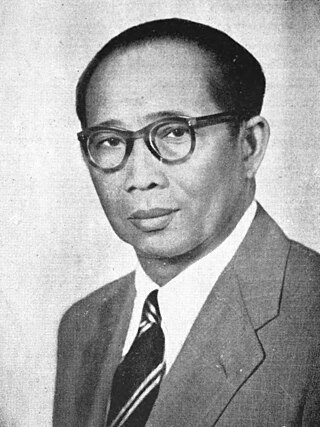
Sidik Djojosukarto was an Indonesian politician who served as chairman of the Indonesian National Party (PNI) from 1950 until his death. As PNI chairman, he was revered by all party factions, and was the closest to being an "authentic party hero."

Oetarjo Anwar Tjokroaminoto was an Indonesian politician and journalist. He served as Minister of Social Affairs for a year in the Wilopo Cabinet and was the Prime Minister of Pasundan for less than a month during January 1950.


















